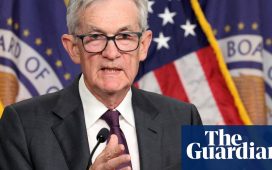Investing.com — Investors are looking ahead to fresh U.S. inflation data later in the holiday-shortened week, with stock markets on Wall Street closed for Memorial Day on Monday. The European Central Bank is poised to cut interest rates prior to its peers in other major economies, the ECB’s chief economist has suggested in an interview with the Financial Times. Elsewhere, proxy advisor Glass Lewis calls on Tesla (NASDAQ:) shareholders to reject a massive pay package for Chief Executive Elon Musk.
1. PCE data ahead this week
The Fed’s preferred inflation gauge — the personal consumption expenditures (PCE) price index — due on Friday will be closely watched for clues about the direction of interest rates over the rest of the year.
The data comes as markets are becoming resigned to the higher-for-longer interest rate narrative after last week’s Fed minutes, along with cautious sounding remarks from policymakers who expressed doubt whether inflation is indeed on a sustainable downward trajectory to its stated 2% target level.
Investors will get the chance to hear more from several Fed speakers during the week, including Governor Michelle Bowman, Cleveland Fed President Loretta Mester, Governor Lisa Cook, New York Fed President John Williams and Atlanta Fed President Raphael Bostic.
The economic calendar also features revised data on first quarter economic growth on Thursday and the Fed’s Beige Book — a summary of economic conditions in the U.S. — on Wednesday.
2. ECB’s Lane says central bank ready to start slashing rates – FT
The European Central Bank is now in a position to begin cutting interest rates down from a record high of 4% at its upcoming policy meeting next week, the ECB’s chief economist Philip Lane told the Financial Times.
Speaking in an interview with the FT, Lane said that “barring major surprises, at this point in time there is enough in what we see to remove the top level of restriction.”
Spurred on by data showing inflation in the euro zone nearing the ECB’s 2% target, markets are widely betting that the central bank will lower its benchmark deposit rate by 25 basis points at its June 6 gathering.
While such a move would echo similar cuts by central banks in countries like Switzerland and Sweden, it would come before other major economies. The Fed and the Bank of England are not tipped to reduce rates until later this year, and investors are wagering that the Bank of Japan could continue to increase them.
Lane suggested that prices in the bloc may have cooled faster than in other economies because it was heavily impacted by a short-term spike in energy costs following the outbreak of the war in Ukraine.
Economists predict that May inflation data out of the euro zone on Friday will show that prices ticked up at a faster annual rate than in the prior month, while the underlying figure is seen remaining at the same year-on-year pace. Investors will likely be keen to see if these numbers will factor in to how the ECB approaches further potential cuts.
3. Asian stocks edge higher, more rate cues awaited
Most Asian stocks advanced on Monday, recovering some ground from losses seen last week, amid anticipation over more cues on U.S. inflation and interest rates in the coming days.
Regional markets took some positive cues from a strong close on Wall Street on Friday, as gains in technology stocks helped the close at an all-time high.
China’s and indices both jumped.
Data on Monday showed Chinese grew at a steady pace in April from the prior month, signaling steady improvement in one of the country’s biggest industries. But easing optimism over recent stimulus measures from Beijing kept gains in Chinese markets limited.
4. Proxy advisor Glass Lewis recommends Tesla shareholders vote against Musk pay package
Proxy advisory group Glass Lewis has recommended that Tesla’s shareholders reject a proposed multi-billion dollar compensation package for Chief Executive Elon Musk at the electric carmaker’s upcoming meeting next month.
Glass Lewis called the pay agreement, which was recently valued at $46 billion, according to the Wall Street Journal, “excessive” on both a “pure dollar basis and in terms of the dilutive effect upon exercise.” In a 71-page report over the weekend, the advisor added that Tesla’s “provided rationale does little to combat” these concerns.
Tesla’s board of directors had originally approved a pay package worth around $55.8 billion in 2018, although it was voided by a judge in the U.S. state of Delaware in January. Last month, the company re-proposed an agreement that includes a 10-year grant of stock options.
The large size of Musk’s potential compensation is justified by Tesla hitting ambitious revenue and stock price targets during his tenure at the helm of the company, Tesla’s board chair Robyn Denholm told Reuters earlier this month.
5. Oil prices rise
Oil prices were higher in European trade on Monday as traders awaited more cues on U.S. inflation and a meeting of the Organization of the Petroleum Exporting Countries this week.
expiring in July rose 0.1% to $82.21 per barrel, while crude futures moved up 0.2% to $77.39 a barrel by 03:27 ET (07:27 GMT).
Trading volumes are expected to be limited with market holidays in the U.S. and the U.K.
Both contracts edged down over 2% each last week due in part to fears that higher for longer interest rates in the U.S. could dent demand in the world’s largest crude consumer. Data showing an unexpected build in U.S. inventories also weighed on crude.







